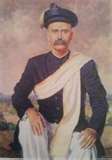This article needs additional citations for verification .(August 2013) |

The Deccan Education Society is an organisation that runs 43 education establishments in Maharashtra, India. Its main branch is situated in Pune.
This article needs additional citations for verification .(August 2013) |

The Deccan Education Society is an organisation that runs 43 education establishments in Maharashtra, India. Its main branch is situated in Pune.
In 1880 Vishnushastri Chiplunkar, Lokmanya Bal Gangadhar Tilak and Gopal Ganesh Agarkar established the New English School, one of the first native-run schools offering Western education in Pune. [1] In 1884 they created the Deccan Education Society [2] [3] with Hon. Justice Mahadev Govind Ranade, Gopal Ganesh Agarkar, Mahadev Ballal Namjoshi, V. S. Apte, V. B. Kelkar, M. S. Gole and N. K. Dharap.The Maharaja of Kolhapur, Chhatrapati Shahu served as the president of the society from 1885 till his death in 1922. [4]
In 1885, the society established Fergusson College, named after the then Governor of Bombay presidency Sir James Fergusson. The college was initially operated out of Gadre Wada in Shaniwar peth area of Pune. At its inception, the college was the first indigenously run higher-education institution in Pune. [5] The college moved to its present site in 1891 in the Deccan Gymkhana area on a 37 acres of land leased for 99 years from Rajaram Naroji Fatil Shirole, the patil of Bhamburda village. [6] [7] In its early years Tilak and Agharkar served as academic staff. Congress party leader, Gopal Krishna Gokhale and social reformer, Dhondo Keshav Karve were also life members of the society and taught at the college in the 1890s. [8]
The society established many schools and colleges in Pune and other towns during following decades such as New English School of Satara in 1899. [9] The society took over the Mawjee Madhavjee English School in Umbergaon in 1919, and the Dravid High School of Wai in 1934. In 1919, the society opened the Willingdon College in Sangli in order to satisfy demand for higher education in southern Maharashtra region. In 1939, the Society decided to enter the field of secondary education for girls by starting the Ahilyadevi High School for Girls in the historic premises of the Holkar Wada in Pune. In 1943, the society started the Brihan Maharashtra College of Commerce, for which the Brihan Maharashtra Sugar Syndicate Ltd. gave to the Society a donation of Rs. 2,00,000. [10] Rulers of many Princely states such as Kolhapur, Bhor and Sangli were patrons of the society. [11]
Institutes run by the Deccan Education Society include:
| Name of Institution | Established | Location |
|---|---|---|
| Fergusson College | 1885 | Pune |
| Willingdon College | 1919 | Sangli |
| Brihan Maharashtra College of Commerce | 1943 | Pune |
| Institute of Management Development and Research, Pune | 1974 | Pune |
| Kirti M. Doongursee College | 1954 | Mumbai |
| Hindustan Antibiotics School | 1958 | Pune |
| DES Pune University | 2023 | Pune |
| Chintamanrao College of Commerce [12] | 1960 | Sangli |
| Chintamanrao Institute of Management Development And Research | 1996 | Sangli |
| DES Navalmal Firodia Law College | 2004 | Pune |
| DES Brijlal Jindal College of Physiotherapy | 2007 | Pune |
| DES Smt. Subhadra K. Jindal College of Nursing | 2008 | Pune |
| Rajarshi Chhatrapati Shahu Maharaj College of Agri-Business Management [13] | 2009 | Sangli |
| Smt. Jayshree Sharadchandra kothari Business School | 2018 | Mumbai |

Bal Gangadhar Tilak, endeared as Lokmanya, was an Indian nationalist, teacher, and an independence activist. He was one third of the Lal Bal Pal triumvirate. The British colonial authorities called him "The father of the Indian unrest". He was also conferred with the title of "Lokmanya", which means "accepted by the people as their leader". Mahatma Gandhi called him "The Maker of Modern India".

Gopal Krishna Gokhale was an Indian political leader and a social reformer during the Indian independence movement, and political mentor of Indian freedom fighter Mahatma Gandhi.

Ratnagiri district is a district in the state of Maharashtra, India. The administrative headquarter of the district is located in the town of Ratnagiri. The district is 11.33% urban. The district is bounded by the Arabian Sea to the west, Sindhudurg district to the south, Raigad district to the north and Satara, Sangli and Kolhapur districts to the east. This district is part of Konkan division.

Fergusson College is an autonomous public-private college offering various courses in the streams of arts and science in the city of Pune, India. It was founded in 1885 by Vaman Shriram Apte, Bal Gangadhar Tilak, Vishnushashtri Chiplunkar, Mahadeo Ballal Namjoshi and Gopal Ganesh Agarkar. Professor Vaman Shivram Apte was its first principal. Social reformer, journalist, thinker and educationist Gopal Ganesh Agarkar served as the second principal from August 1892, till his death in June 1895.

Irawati Karve was an Indian sociologist, anthropologist, educationist and writer from Maharashtra, India. She was one of the students of G.S. Ghurye, founder of Indian Sociology & Sociology in India. She has been claimed to be the first female Indian Sociologist.

Dhondo Keshav Karve, popularly known as Maharshi Karve, was a social reformer in India in the field of women's welfare. He advocated widow remarriage, and he himself remarried a widow as a widower. Karve was a pioneer in promoting widows' education. He founded the first women's university in India, the SNDT Women's University in 1916. The Government of India awarded him with the highest civilian award, the Bharat Ratna, in 1958, the year of his 100th birthday. He organized a conference against the practice of devdasi. He started 'Anath balikashram' an orphanage for girls. His intention was to give education to all women and make them stand on their own feet. Through his efforts, the first women university was set up in 20th century.

The Chitpavan Brahmin or the Kokanastha Brahmin is a Hindu Maharashtrian Brahmin community inhabiting Konkan, the coastal region of the state of Maharashtra. Initially working as messengers and spies in the late seventeenth century, the community came into prominence during the 18th century when the heirs of Peshwa from the Bhat family of Balaji Vishwanath became the de facto rulers of the Maratha empire. Until the 18th century, the Chitpavans were held in low esteem by the Deshastha, the older established Brahmin community of Karnataka-Maharashtra region.

Dattatreya Gopal Karve was an Indian economist and professor who contributed to the fields of economics, public administration and the cooperative movement in India. He was also the deputy governor of the Reserve Bank of India from 1962 to 1964.

Hari Narayan Apte was an Indian Marathi language writer.
Social reformers are individuals who actively challenge and seek to change societal norms and structures that perpetuate inequality and injustice. Their work addresses systemic issues such as caste discrimination, gender bias, economic disparity, and access to education and healthcare. By advocating for the rights of marginalized communities, social reformers aim to dismantle oppressive practices and create a more just and equitable society.

Deccan College Post-Graduate and Research Institute, also referred to as Deccan College, is a post-graduate institute of Archeology, Linguistics and Sanskrit & Lexicography in Pune, India.

Gopal Ganesh Agarkar was a social reformer, educationist, and thinker from Bombay Presidency, British India.

Sir Raghunath Purushottam Paranjpye also known as Wrangler Paranjpye was an Indian mathematician and diplomat who served as the 1st High Commissioner of India to Australia from 1945 to 1947. He became the first Indian to achieve the coveted title of Senior Wrangler at the University of Cambridge. Later in life he also served as the Vice Chancellor of many Indian universities.

Willingdon College, Sangli, is a college named after the former Governor of Bombay, The 1st Baron Willingdon. Lord Willingdon later served as Viceroy of India, from 1931 until 1936. The college was started on the morning of 22 June 1919 in the Sangli City. During this period, Centers of higher education and colleges were rare. With the establishment of the Willingdon College, the students in Southern Maharashtra and from the districts of Belgaum, Dharwad, Karwar and Bijapur were greatly benefited. The institute is situated in the Vishrambag area of Sangli-Miraj-Kupwad Municipal Corporation, roughly midway between the twin cities of Miraj and Sangli.

Brihan Maharashtra College of Commerce is a college in Pune, Maharashtra, India. The college was established in 1943 by the Deccan Education Society. It is affiliated to Savitribai Phule Pune University.

Chandrashekhar Govind Agashe was an Indian industrialist and lawyer, best remembered as the founder of the Brihan Maharashtra Sugar Syndicate Ltd. He served as the managing agent of the company from its inception in 1934 till his death in 1956. He served as the President of the Bhor State Council from 1934 to 1948, having previously been the council's Vice President from 1933 to 1934, its Secretary from 1932 to 1933, and the Chief Justiciar of the Indian princely state itself from 1920 to 1932.
{{cite book}}: CS1 maint: location missing publisher (link)11. Fegusson college official website - http://www.fergusson.edu/blocks/index/id/5